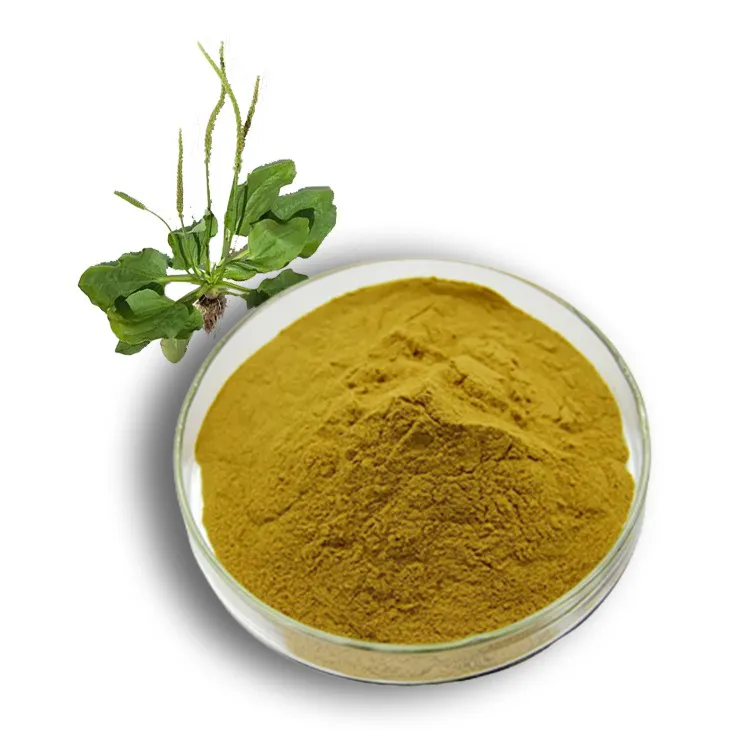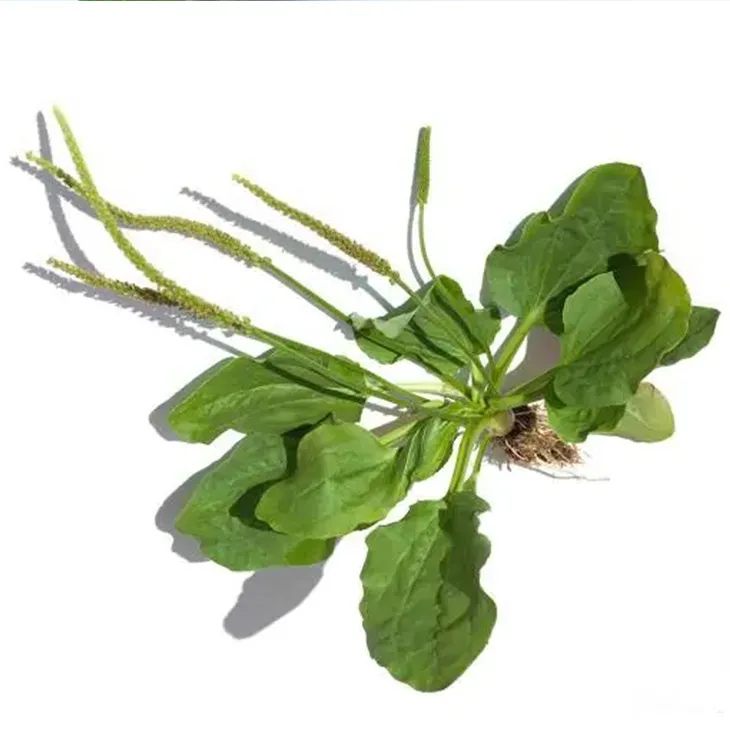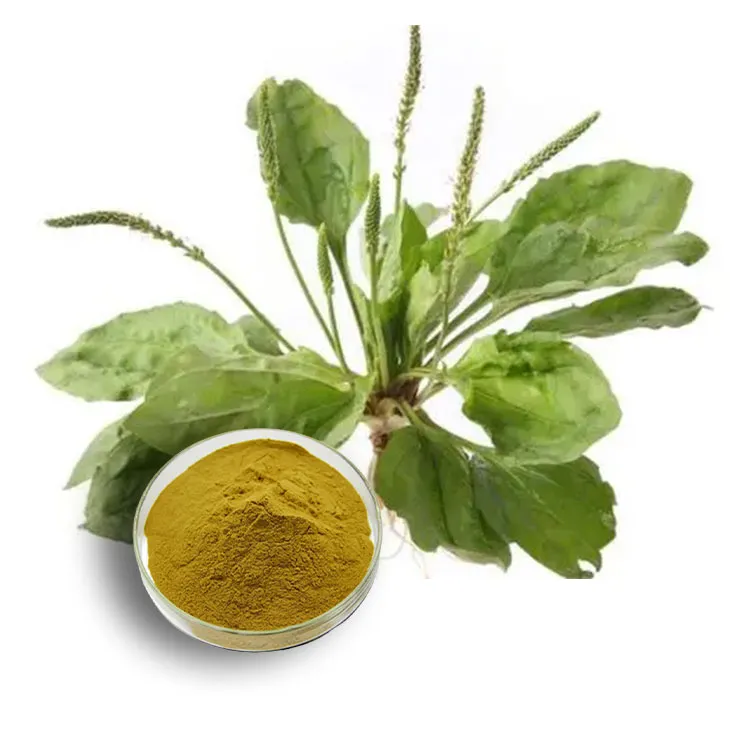- 0086-571-85302990
- sales@greenskybio.com
Chinese plantain extract suppliers.
2024-12-01

Introduction to Chinese Plantain
The plantain, with numerous varieties native to China, is a remarkable plant. It has a long history of being used in traditional Chinese medicine. This plant is known for being rich in bioactive compounds, which are substances that have an effect on living organisms. These bioactive compounds are the key reasons why Plantain extract has various potential applications in the fields of health and medicine.

Advantages of Chinese Suppliers
Abundant Resources
One of the major advantages that Chinese Plantain extract suppliers have is the access to a large quantity of plantain resources. China's vast territory and diverse climate conditions provide suitable environments for the growth of different varieties of plantain. This availability of raw materials in large quantities allows suppliers to meet both domestic and international market demands.
Sustainable Extraction Methods
Chinese suppliers are increasingly committed to sustainable extraction methods. They understand the importance of environmental protection while aiming to maximize the yield of high - quality extract. Sustainable extraction not only helps in conserving the plantain resources for future generations but also ensures that the ecological balance of the areas where plantain is grown is maintained. For example, some suppliers use advanced farming techniques that reduce the impact on the soil and surrounding ecosystems during the cultivation and extraction processes.

Modern Extraction Facilities
Chinese Plantain extract suppliers have invested in modern extraction facilities. These facilities are equipped with state - of - the - art technology for separating and purifying the beneficial components of plantain. The use of modern technology ensures the consistency and quality of the extract. For instance, high - performance liquid chromatography (HPLC) is often used to accurately identify and quantify the bioactive compounds in the plantain extract. This level of precision in extraction and analysis is crucial for producing a high - quality product that meets international standards.

Domestic and International Markets
Meeting Domestic Demand
In China, plantain extract has been an important part of traditional Chinese medicine for centuries. The domestic market has a long - standing demand for plantain - based products, such as herbal remedies. Chinese suppliers play a vital role in meeting this domestic demand by providing a reliable source of high - quality plantain extract. They work closely with traditional Chinese medicine practitioners and manufacturers to ensure that the extract is used effectively in various traditional formulations.
Active in Export
Besides catering to the domestic market, Chinese plantain extract suppliers are also very active in the international export market. The global interest in natural and herbal products has been on the rise, and plantain extract fits well into this trend. Suppliers are exporting their products to various countries, where they are used in dietary supplements, herbal remedies, and other health - related products. They have to comply with international regulations and quality standards to enter these foreign markets. For example, in the European Union and the United States, strict regulations govern the import of herbal extracts, and Chinese suppliers are making efforts to meet these requirements.
Applications of Plantain Extract
Herbal Remedies
Plantain extract has a long - established use in herbal remedies. In traditional Chinese medicine, it has been used to treat various ailments, such as respiratory problems, digestive disorders, and skin conditions. For respiratory problems, it may help soothe coughs and reduce inflammation in the lungs. In the case of digestive disorders, it could potentially aid in improving digestion and relieving stomachaches. Skin conditions like rashes and minor wounds may also benefit from the application of plantain extract due to its anti - inflammatory and healing properties.
Dietary Supplements
As a dietary supplement, plantain extract is becoming increasingly popular. It is often included in products that claim to support overall health and well - being. Some of the potential benefits associated with plantain extract in dietary supplements include antioxidant effects, which can help protect the body from free radical damage. It may also have a positive impact on the immune system, helping the body to fight off infections more effectively. Additionally, it could potentially contribute to better cardiovascular health by reducing cholesterol levels or improving blood circulation.
Quality Control and Standardization
Chinese plantain extract suppliers place a great emphasis on quality control and standardization. They follow strict procedures throughout the production process, from the cultivation of plantain to the final extraction and packaging of the product. Good Agricultural Practice (GAP) is often implemented during the cultivation stage to ensure the quality of the raw materials. At the extraction and processing stages, Good Manufacturing Practice (GMP) standards are adhered to. This includes proper handling of equipment, quality testing of intermediate and final products, and strict hygiene requirements. Quality control also involves the identification and quantification of bioactive compounds in the extract using advanced analytical methods. By ensuring quality control and standardization, Chinese suppliers are able to provide a consistent and reliable product to the market.
Future Prospects
The future looks promising for Chinese plantain extract suppliers. With the increasing global demand for natural and herbal products, there is a great potential for further growth in the export market. Suppliers are likely to continue investing in research and development to explore new applications of plantain extract. They may also collaborate with international partners to expand their market reach and share knowledge on extraction techniques and quality control. However, they will also face challenges such as competition from other countries, changing international regulations, and the need to continuously improve product quality. Despite these challenges, the unique advantages of Chinese plantain extract suppliers, including their access to abundant resources, sustainable extraction methods, and modern extraction facilities, position them well for future success in the global market.
FAQ:
What are the main bioactive compounds in Chinese plantain extract?
Chinese plantain extract is rich in various bioactive compounds. Some of the main ones include polysaccharides, flavonoids, and phenolic acids. These compounds are believed to contribute to its potential health benefits, such as antioxidant, anti - inflammatory, and diuretic properties.
How do Chinese plantain extract suppliers ensure the quality of their products?
Chinese plantain extract suppliers ensure product quality in several ways. They start with high - quality plantain resources. Their extraction facilities are equipped with modern technology for separation and purification, which helps to obtain pure and effective extracts. Additionally, they follow strict quality control standards, often including testing for purity, potency, and safety at various stages of production.
What are the applications of Chinese plantain extract in the international market?
In the international market, Chinese plantain extract is used in multiple applications. It is used in herbal remedies, where it may be formulated to treat various ailments based on its traditional uses. It is also a common ingredient in dietary supplements, due to its potential health - promoting properties. Moreover, it may be used in the development of other health - related products, such as natural cosmetics.
How do Chinese plantain extract suppliers contribute to environmental protection?
Chinese plantain extract suppliers contribute to environmental protection through sustainable extraction methods. They ensure that while harvesting plantain resources, they do not over - exploit the natural habitats. They may also use environmentally friendly extraction processes that minimize waste and pollution. By maintaining a balance between resource extraction and environmental conservation, they help to protect the ecosystems where plantain grows.
What are the advantages of Chinese plantain extract suppliers compared to others?
Chinese plantain extract suppliers have several advantages. They have access to a large quantity of native plantain resources in China, which gives them a stable source of raw materials. Their long - standing experience in traditional Chinese medicine related to plantain provides them with in - depth knowledge of the plant's properties. Moreover, they are increasingly adopting modern extraction and quality control technologies, making their products competitive in both domestic and international markets.
Related literature
- The Bioactive Compounds of Chinese Plantain and Their Potential Health Benefits"
- "Sustainable Extraction Practices in Chinese Plantain Extract Production"
- "Chinese Plantain Extract in the Global Dietary Supplement Market"
- ▶ Hesperidin
- ▶ citrus bioflavonoids
- ▶ plant extract
- ▶ lycopene
- ▶ Diosmin
- ▶ Grape seed extract
- ▶ Sea buckthorn Juice Powder
- ▶ Beetroot powder
- ▶ Hops Extract
- ▶ Artichoke Extract
- ▶ Reishi mushroom extract
- ▶ Astaxanthin
- ▶ Green Tea Extract
- ▶ Curcumin Extract
- ▶ Horse Chestnut Extract
- ▶ Other Problems
- ▶ Boswellia Serrata Extract
- ▶ Resveratrol Extract
- ▶ Marigold Extract
- ▶ Grape Leaf Extract
- ▶ blog3
- ▶ blog4
-
The best lemon juice powder in nature.
2024-12-01
-
Organic Vitamin K2 Powder Suppliers
2024-12-01
-
Bulk purchase of L - tyrosine.
2024-12-01
-
Vitamin K2 Manufacturers
2024-12-01
-
100% Pure Natural Rutin.
2024-12-01
-
Chinese Citrus Bioflavonoid Suppliers.
2024-12-01
-
Berberis aristata Extract
2024-12-01
-
Phyllanthus Emblica Extract
2024-12-01
-
Panax Ginseng Leaf Extract
2024-12-01
-
Saffron Extract Powder
2024-12-01
-
Red Date Extract
2024-12-01
-
Alisma Extract
2024-12-01
-
Polygonum Cuspidatum Extract
2024-12-01
-
Carrageenan Extract Powder
2024-12-01
-
Elderberry Extract
2024-12-01
-
Lily extract
2024-12-01





















